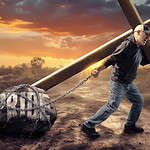
Listen along as we take a look at the parallels provided in the Patriarch Era of the bible to the process of naming the next CEO in your family. In this episode we take a look at God's plan for succession and challenge tradition. God's plan always trumps tradition. Holy Profits Radio (http://www.holyprofitsradio.com) airs live each Saturday on 95.7 WGNW LP The Choice (Candler), is hosted by Bradley Waldrop and a production of Chrysalis Consulting, LLC (http://www.leading4achange.com).
Transcript:
Holy Profits Radio Transcript
Introduction
Speaker 1:
Welcome to Holy Profits Radio, a business show that applies God's word to your work. Discussing business basics ranging from starting your own company to complex human resource challenges. Check out our complete schedule, archive shows, helpful downloads, and much more at holyprofitsradio.com. Now, get ready to be part of the revolution by applying biblical truths to your work with Holy Profits Radio, hosted by me, Bradley Waldrop.
Show Preview and Updates
Speaker 2:
Good morning, and welcome to the show. We are going to be talking about some exciting things. And we have some new knobs and buttons and wires and everything else here in the studio today, so it's been a lot of fun to watch it go together. Over these last couple weeks, we've been concentrating on applying God's word to your work. And last week, we talked about work being a four-letter word, and we discussed the function of work and how we're made. If you missed that, please feel free to get online at holyprofitsradio.com and go to the archives. We are in the midst of putting up a number of shows into the podcast and the YouTube channel as well.
Upcoming Guests and Topics
We are going to be having some really great guests coming up in the next few weeks. I just wanted to give you a little preview of where we're really gonna go. We've got a gentleman from the local area named Mel who's gonna be on our show. We're gonna talk about how to get your company connected to the local community and how to participate and develop relationships on a local level to boost your business. We're gonna talk about how ethics are so essential to organizations and how easy it is to make mistakes. We're also going to have a gentleman named Chuck Gallagher on in the next few weeks. Additionally, we have a couple of different authors with books on how they're applying God's word to work and personal and business finances. It's really going to be a great series of shows coming up between now and the middle of October, so please stay tuned for all of that.
You can get updates to the show on holyprofitsradio.com. You can also go to our Facebook page and like our Facebook page at facebook.com/holyprofits. We are on Twitter at holyprofits, and there are lots of different ways to get a hold of us and participate with us. We have a really great show today. I had a chance to grow up in a family-owned business. So today, if you are in a family-owned business, if you own a family-owned business, if you are that family trying to figure it all out, if you're getting ready to buy one, or if you're in ministry right now, those are like family-owned businesses too.
Challenges in Family-Owned Businesses
There's so many personal relationships that get intertwined in the operation of the organization. Today's show is certainly going to be for you. If you have ever worked in a family-owned business, you probably understand a little bit of the dysfunction that exists in a family-owned business. The dysfunction exists because we tend to want to make things right by the family and we sacrifice really great decisions for personal politics. It's a very tricky thing. It's very difficult to balance the family portion of the business and the business portion of the company. What we're going to talk about today is how to transition the leadership in those organizations.
Transitioning Leadership in Family-Owned Businesses
That is not easy. In fact, not very long ago, a friend of mine was lamenting that he has a family-owned business, and dad's still involved. He's trying to figure out how to get dad out of the company and do it politically correct, in lots of love with dad to say, "You know, your time here has been great. Please let me take it and do something different with the company than where we've been. Let me take the good foundation you have given me and make it better." That's a very hard thing. I get that.
In fact, I used to work for a family-owned business and just to give you a kind of a background here real quick, I grew up in family-owned businesses. My parents owned a business in a partnership, and we worked as kids in the store. And then, later on, a number of years later, my father owned a franchise, and we grew up in that environment. My first professional job was working for an engineering firm that was owned by a family. The second one was owned by a family. The third one, fourth one, and fifth one were owned by families.
The Dynamics of Family-Owned Businesses
The family-owned business dynamic is really unique, but it's very popular. In the United States, we have an awful lot of businesses that are owned by families. The reason I say that if you're in ministry, it's like a family-owned business too. Ministry just sort of permeates every part of who you are, and what happens at home also carries over into the ministry. And so, it's really important to understand those family dynamics. When we try to transition an organization's leadership, the leadership of a family-owned business, we are challenged. And part of that challenge is do we do what is traditional and give the business to the oldest child, to the individual who seems to be hanging out at the company more often, or do we do something completely and totally different?
That's very difficult to understand. When I worked in a professional organization's family-owned business, here's what the process looked like. We wanted to figure out how to get the right person in, and we had to look at qualifications. When we look at qualifications, we want to understand how to set those up so someone can come into the company and do well. When we decide to try to find somebody, we have two options. We can either do an internal search or an external search. When you start an internal search, you actually start a little internal competition.
With that kind of competition, you end up with hurt feelings. You end up with one-upsmanship. You end up with lots of chatter at the water cooler about who would do a better job. It's a real interesting dynamic. The external search breaches confidence in the organization, and those hanging out in the company looking for the tap on the shoulder and opportunity to take the next leadership role end up feeling really discouraged because you're looking outside. There are lots of different dynamics with changing the leadership in an organization. I thought we could look at a fun story from the Bible, and we're going to look at Isaac, Rebecca, their two kids, Esau and Jacob, and try to understand what an example looks like of transferring ownership and leadership in a family.
Biblical Example: Isaac, Rebecca, Esau, and Jacob
For those of you who are listening and don't remember who all these characters are, this story is in the book of Genesis. It's part of the patriarch era. The patriarch era is the fathers of the faith in the Bible, and we have Abraham and Isaac. If you remember, when we did the last patriarch era show, we talked about this Abraham and Isaac dilemma and challenging the leader of his own faith. So Isaac is the kid that was going to be sacrificed, and God saved him by providing another sacrifice. I can't even imagine what life has got to be like growing up being Isaac, knowing that your dad had to take you to an altar and attempt to kill you to satisfy God's desire in Abraham's life and God's challenge to his dad.
That can either shake your faith or strengthen your faith, one of the two. It appears if you read through the Bible in Genesis 25, right in the middle of that chapter is where it starts. If you start to read, you start to realize that this process actually strengthened Isaac's faith. Isaac lived this life to try to please God. He ended up getting married at a relatively old age of 40 years old. He married Rebecca, who happens to be his cousin. Isaac is one of those folks in the early part of the Bible that only had one wife, which is kind of unique.
He was trying to ensure the future for the nation of Israel would come through Isaac. At 40 years old, he's trying to find a wife and have kids. He finds that his wife is barren, and he goes to God. The irony there for me is that he was born similarly when Abraham couldn't have a child. God said you're going to have a child, and he was up in his years, and his wife was barren as well. They were frustrated and went to God to ask for a child. Isaac had to do the same thing, which is really strange to me. What's great about it is that he didn't have to wait nearly as long as Abraham, and he wasn't tempted to do something outside God's will and plan.
Sibling Rivalry: Esau and Jacob
Isaac and Rebecca ended up having twins, and the twins were fighting in the womb. If any of you have brothers or sisters, you know what life looked like growing up. It wasn't always rainbows and lollipops. It was a lot of anger, frustration, and competition. I don't know if my competition with my brother was as dramatic as Esau and Jacob, but they were fighting in the womb, and this is who they were. They grew up with a lot of animosity between them. One was a shepherd, and the other was a hunter. Dad loved the hunter, but the personality of the shepherd was a lot like dad. Rebecca understood, going to God early on, that Jacob was supposed to be the leader. Jacob was the second one out of the womb. So tradition would say that's all screwed up. It actually says that the older shall serve the younger and the younger shall be stronger. Stronger in that context was not just physical strength; it was emotional strength and faith strength as well.
This animosity between the two reached its peak when Jacob tricked his brother out of his birthright. Back then, the birthright was a huge deal
. Tradition said that when dad died, the oldest son got twice as much as any of the other kids. It was a big deal, and Isaac was a rich individual, so there was a lot at stake. There were lots of character issues along the way, but what's interesting to me is that God's plan always trumps tradition.
Key Lessons from the Story
There were many traditional things that Isaac and Rebecca tried to follow through with. They were trying to make sure that Esau was the heir and received his birthright. Even after he gave up his birthright, Isaac tried to give Esau the blessing of being the oldest child, and that was messed up too. In all of that, God found a way to make what he said to Rebecca come true. His promise to Rebecca that the younger shall serve the older and be the stronger of the two came through. The confidence I take from that is that no matter how badly we screw up, God can make it right within his own will, and he does not necessarily look at the traditions we have constructed for ourselves.
God can draw a straight line with a crooked stick, and that is what's happening in this particular story. What I think is important, though, is that if you look at that story, there are four or five key components that come out of that. First, God really does have a succession plan for every family, business, and organization. He understands what that looks like, and it may not be traditional. Second, God explains the unexplainable. When the twins were in Rebecca's womb, they were fighting, and Rebecca went to God to say, "Hey, what's going on here?" God revealed to her what the conflict was and why it was there. So God certainly can explain the unexplainable. Third, God creates each one of us with a special purpose. It's not about comparing ourselves to one another; instead, it's understanding where we fit in the organization based on how God made us. Fourth, God's plan always trumps tradition. And lastly, whoever you pick to be the successor in the organization, they are not going to be you.
Challenges in Successorship
If you own the company, if you're the leader in a ministry, and you're trying to find that next person, remember that who you pick is not you. They can't be you. In fact, they're going to be so different from you that sometimes it's going to really bother you. But they are crafted in a way that can help take your organization to the next level. If you are an employee, a team member, or a volunteer in these companies, this can really cause a lot of anguish. Know that God's plan always trumps tradition, so there is hope for you. Keep doing your job and do it well so your qualities can shine. If God taps you on the shoulder, then you're ready. Trust in the organization that you can actually deliver beyond that.
Applying Biblical Lessons to Business
Next week, we're going to talk about how to expand your influence in an organization, specifically talking about networking and how to develop personal relationships that really boost your business. We're going to have Mel Fergenbaum on next week, and we're going to talk about the Exodus era. The Exodus era is when the Israelites were leaving Egypt and going into brand new territory. They had to create these relationships. If you have questions about the show, feel free to send me an email at bradley@holyprofitsradio.com, or you can get on our Facebook page at facebook.com/holyprofits. You can visit our webpage at holyprofitsradio.com. May God richly bless you and your business. Have a great week.
Unleash the Power of God’s Blessings in Your Business with Bradley Waldrop – A True Authority in Business Integrity Matters
As a founding board member of Jacob’s House and The Joseph Initiative, a steering committee member for University of California, Riverside’s A.Gary Anderson Graduate School of Management, and the winner of the fastest growing small business inside a leading international professional services business, I have the knowledge and experience to help you navigate the challenges of business integrity matters. My role as an author, small group study leader, change agent, and non-profit board member, along with my past experience as a men’s ministry director and successful business leader, uniquely qualifies me to help Christian business owners honor and glorify God in their businesses.
It’s time to take your business to the next level by aligning your goals with God’s blessings and honoring Him through your business practices. I will inspire you to tap into the power of God’s blessings and provide you with practical strategies to integrate faith-based principles into your business operations. Together, we can make a positive impact in the business world while honoring God in all that we do.






Leave a Reply